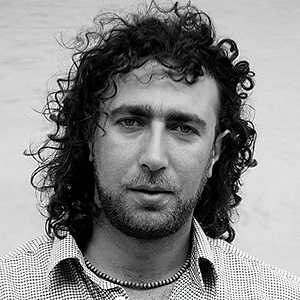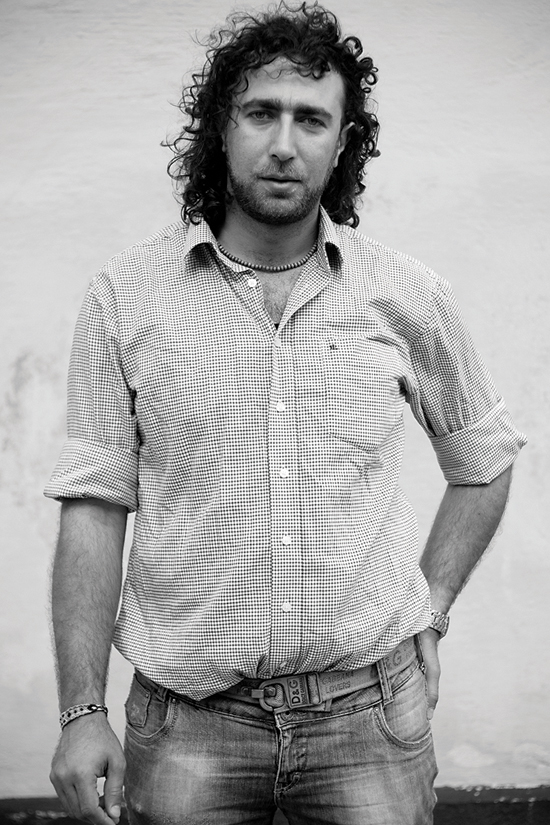The Palestinian poet Ghayath Almadhoun was born in Damascus in 1979 and has lived in Stockholm since 2008. He has published three collections of poetry, the latest in Beirut in 2014, and his work has been translated into many languages. In Sweden he has been translated and published in two collections: Asylansökan (Ersatz, 2010) was awarded the “Klas de Vylders stipendiefond” for immigrant writers. Till Damaskus (Albert Bonniers Förlag, 2014), authored together with the Swedish poet Marie Silkeberg, was included in the list of Best New Books in Sweden in Dagens Nyheter (Sweden’s largest newspaper) and converted to a radio play for Swedish National Radio. With Silkeberg, Almadhoun has made several poetry films that can be viewed at the Moving Poems website. The Dutch translation of Almadhoun’s Weg van Damascus was among the top 10 best-selling poetry books in Belgium in 2015. A series of poems by Almadhoun will be projected on the façade of Aarhus Theatre as part of “For Aarhus,” a new work by renowned American artist Jenny Holzer in celebration of Aarhus Capital of Culture 2017. His poetry collection Adrenaline, translated into English by Catherine Cobham, will be published by Action Books, USA, in 2017.
Details (excerpt)
Do you know why people die when they are pierced by a bullet?
Because 70% of the human body is made up of water
Just as if you made a hole in a water tank.
Was it a random clash dancing at the head of the alley when I passed
Or was there a sniper watching me and counting my final steps?
Was it a stray bullet
Or was I a stray man even though I’m a third of a century old?
Is it friendly fire?
How can it be
When I’ve never made friends with fire in my life?
Do you think I got in the way of the bullet
Or it got in my way?
So how am I supposed to know when it’s passing and which way it will go?
Is an encounter with a bullet considered a crash in the conventional sense
Like what happens between two cars?
Will my body and my hard bones smash its ribs too
And cause its death?
Or will it survive?
Did it try to avoid me?
Was my body soft?
And did this little thing as small as a mulberry feel female in my maleness?
The sniper aimed at me without bothering to find out that I’m allergic to snipers’ bullets
And it’s an allergy of a most serious kind, and can be fatal.
The sniper didn’t ask my permission before he fired, an obvious example of the lack of civility that has become all too common these days.
I was exploring the difference between revolution and war when a bullet passed through my body
In a reconstructed city like Berlin lies a secret that everyone knows, which is that the…
No, I will not repeat what is known, but I will tell you something you don’t know: the problem with war is not those who die, but those who remain alive after the war.
This city is bigger than a poet’s heart and smaller than his poem, but it is big enough for the dead to commit suicide without troubling anyone, for traffic lights to bloom in the suburbs, for a policeman to become part of the solution and the streets a mere background to truth.

I sold my white days on the black market, and bought a house overlooking the war, and the view was so wonderful that I could not resist its temptation, so my poem deviated from the shaykh’s teachings, and my friends accused me of cutting myself off, I put kohl on my eyes and became more Arab, and drank camel’s milk in a dream and woke up as a poet, I was watching the war like lepers watch people’s eyes, and had arrived at frightening truths about poetry and the white man, about the season of migration to Europe, and about cities that receive tourists in peacetime and mujahidin in wartime, about women who suffer too much in peacetime, and become fuel for the war in wartime.
It was the most beautiful war I’ve been in in my life, full of metaphors and poetic images, I remember how I used to sweat adrenalin and piss black smoke, how I used to eat my flesh and drink screams, death with his scrawny body leaned on the destruction committed by his poem, and wiped his knife clean of my salt, and the city rubbed my shoes with her evening and the street smiled and the city counted the fingers of my sorrow and dropped them on the road leading to her, death weeps and the city remembers the features of her killer and sends me a stabbing by post, threatening me with happiness, and hangs my heart out on her washing line strung between two memories, and oblivion pulls me towards myself, deeply towards myself, deeply, so my language falls on morning, and balconies fall on songs, headscarves on kisses, back streets on women’s bodies, the details of alleyways on history, the city falls on the cemeteries, dreams fall on the prisons, the poor on joy, and I fall on memory.
Just as if you are eating your beloved’s fingers, or suckling from an electric cable, or being inoculated against shrapnel, just as if you are a memory thief, come, let’s give up poetry, exchange the songs of summer for gauze dressings and harvest poems for surgical thread, leave your kitchen and the children’s bedroom and follow me so that we can drink tea behind the sandbags, the massacre has room for everyone, put your dreams in the shed and give the plants on the balcony plenty of water, for the discussion with iron may go on for a while, leave behind Rumi, Averroes and Hegel, and bring along Machiavelli and Huntington and Fukuyama, for we need them now, leave behind your laughter, your blue shirt and warm bed, and bring your teeth and nails and hunting knife, and come.
Throw away the Renaissance and bring on the inquisition,
Throw away European civilization and bring on the Kristallnacht,
Throw away socialism and bring on Joseph Stalin,
Throw away Rimbaud’s poems and bring on the slave trade,
Throw away Michel Foucault and bring on the Aids virus,
Throw away Heidegger’s philosophy and bring on the purity of the Aryan race,
Throw away Hemingway’s sun that also rises and bring on the bullet in the head,
Throw away Van Gogh’s starry sky and bring on the severed ear,
Throw away Picasso’s Guernica and bring on the real Guernica with its smell of fresh blood,
We need these things now, we need them to begin the celebration.
Translated from Arabic by Catherine Cobham.
For a version of the entire poem,
visit https://www.ghayathalmadhoun.com/poetry-in-english.
A poetry film with a reading of excerpts of this poem by the author is available on Moving Poems at http://movingpoems.com/filmmaker/ghayath-almadhoun/.



